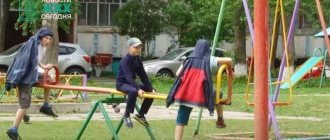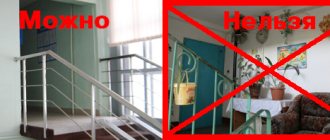Access to the common property of the house is necessary for repair work
The organization managing the house, under a management agreement, is obliged to maintain in proper condition the common property of the owners of premises in an apartment building (Part 2 of Article 162 of the Housing Code of the Russian Federation).
To such property, in accordance with Part 1 of Art. 36 Housing Code of the Russian Federation, pp. 5 – 7 RF PP No. 491, include common areas that are intended to serve more than one room in the house, roofs, load-bearing and non-load-bearing structures, a land plot with all objects on it, as well as all engineering and technical equipment intended to serve two and more premises.
At the same time, in an apartment building, free access to the common property of the house must be provided: for use by the owners and tenants of the premises, for routine and major repairs by the management organization (in paragraphs “b”, paragraph 32, “e”, paragraph 34 of the RF PP No. 354 ).
Accessibility for disabled people of residential premises and common property in apartment buildings
192191
Housing and communal services news
In the work of management organizations, situations often arise when employees of the management organization need to get into the owner’s apartment to carry out work on repairs or maintenance of common property . Of course, most owners are understanding and do not interfere with repair work. But there are also those who refuse to allow employees of the management company into the apartment, or are categorically against carrying out the work due to expensive repairs that hide communications. In this article we will try to figure out how to act in such cases.
According to clause 31 of the Rules for the provision of utility services to owners and users of premises in apartment buildings and residential buildings, approved by Decree of the Government of the Russian Federation dated 05/06/2011 No. 354 (hereinafter referred to as Rules No. 354), the contractor is obliged to verbally agree with the consumer on the time of access to residential or non-residential premises occupied by him or send him a written notice of planned work inside the premises no later than 3 working days before the start of such work, which must indicate: the date and time of the work, the type of work and the duration of the work; telephone number by which the consumer has the right to agree on a different date and time for the work, but no later than 5 business days from the date of receipt of the notification; position, surname, name and patronymic of the person responsible for the work.
Therefore, the first thing to do is notify the owner.
If at the appointed time the owner did not allow employees of the management organization, it is necessary to draw up an act of non-admission to the premises to carry out repair (maintenance) work on common property.
After a couple of such acts, you can safely go to court. After all, as you know, it is the management organization that is responsible for the maintenance of common property, and in the event of an accident, it is the management organization that may be the last resort.
In accordance with clause 1.1 of Art. 161 of the Housing Code of the Russian Federation, proper maintenance of the common property of the owners of premises in an apartment building must be carried out in accordance with the requirements of the legislation of the Russian Federation, while the management company is not responsible for the actions of the owners.
By virtue of clause 42 of the Rules for the maintenance of common property in an apartment building, approved by Decree of the Government of the Russian Federation of August 13, 2006 No. 491 (hereinafter referred to as rules 491), management organizations and persons providing services and performing work in the direct management of an apartment building are responsible to the owners of the premises for violation of their obligations and are responsible for the proper maintenance of common property in accordance with the legislation of the Russian Federation and the agreement.
Within the meaning of Art. 36 of the Housing Code of the Russian Federation, common property in an apartment building includes, in particular, mechanical, electrical, sanitary and other equipment located in a given building outside or inside the premises and serving more than one room.
In accordance with clause 41 of Rules 491, the owners of premises are responsible for the proper maintenance of common property in accordance with the legislation of the Russian Federation.
Clause 34 (subclause “e”) of Rules No. 354 provides for the owner’s obligation to allow representatives of the management company into the occupied residential or non-residential premises to carry out necessary repair work - as necessary, and to eliminate accidents - at any time.
According to Art. 290 of the Civil Code of the Russian Federation, the owners of apartments in an apartment building own, by right of common shared ownership, the common premises of the house, the supporting structures of the house, mechanical, electrical, sanitary and other equipment outside or inside the apartment that serves more than one apartment.
Decree of the Government of the Russian Federation dated January 21, 2006 No. 25 approved the Rules for the use of residential premises. In accordance with paragraphs. B, In paragraph 19 of these rules, the owner of the residential premises is obliged to ensure the safety of the residential premises and maintain the proper condition of the residential premises.
Thus, the actions of the owners to prevent the repair of common property located in an apartment owned by them are an abuse of their right, associated with a threat to ensure the safety of the property of other persons and common property.
As a rule, the courts satisfy such claims of management organizations. An example is the decision of the Central District Court of Khabarovsk dated August 4, 2018 in case No. 2-2596/2017, the Decision of the Murom City Court of the Vladimir Region dated July 16, 2021 in case No. 2-661/2018, the Decision of the Soviet- Gavansky City Court of the Khabarovsk Territory dated July 11, 2021 in case No. 2-519/2018.
Often, repair work on common property must be carried out as soon as possible in order to avoid a serious accident and large losses. In such cases, when applying to court, the pleading part of the claim must indicate the immediate execution of the court decision. In accordance with Art. 212 of the Civil Procedure Code of the Russian Federation, the court may, at the request of the plaintiff, apply for immediate execution of the decision if, due to special circumstances, delaying its execution may lead to significant damage to the claimant or execution may be impossible. The issue of immediate execution of a court decision may be considered simultaneously with the adoption of the court decision.
Thus, in the decision of the Surgut City Court of the Khanty-Mansiysk Autonomous Okrug-Ugra dated August 26, 2021 in case No. 2-12736/2016, it is stated:
“Due to the limited period of work (according to the work schedule), the repair of the heating system must be completed before a certain date), the court agrees with the plaintiff’s arguments that due to the existing risk for the plaintiff to violate contractual obligations for the timely completion of repair work from -due to the refusal of the defendants to provide access to the apartment, a slowdown in the execution of the court decision in this case can lead to significant damage both for the plaintiff (in the form of a penalty) and for the owners of other premises in the house (in the form of a lack of heating, and, as a consequence, freezing of premises, lack of gas supply, recalculations for improper provision of services, etc.).”
Under such circumstances, the court decision regarding the provision of access to residential premises to carry out repair work on the heating system should be carried out immediately.
Well, if the management organization did not promptly file a claim with the owner to ensure access to common property, was unable to carry out the work and an accident occurred (for example, a riser burst), the main proof of its innocence in court with the owners of the affected apartments will be notifications to the owners on the approval of the date and time of work and acts of non-admission.
In accordance with clause 1.1 of Art. 161 of the Housing Code of the Russian Federation, proper maintenance of the common property of the owners of premises in an apartment building must be carried out in accordance with the requirements of the legislation of the Russian Federation, while the management company is not responsible for the actions of the owners. As judicial practice shows, in order to compensate for harm to the victim, it is necessary to simultaneously prove the presence of harm, its size and the cause-and-effect relationship between its occurrence and the actions of the harm-doer (Determination of the Leningrad Regional Court dated April 10, 2014 No. 33-1811/2014).
Based on materials from the Burmistr.ru blog.
Reconstruction of premises should not interfere with the owner’s access to the common property of the house
The owner can reconstruct his apartment and expand it at the expense of common property only if this was given the consent of 100% of the owners at the general meeting, since such actions entail a reduction in the composition of the UI MKD (Part 2 of Article 40 of the Housing Code of the Russian Federation). The local government must also approve the redevelopment.
At the same time, the reconstruction of the owner’s premises should not limit access to communications and engineering systems that belong to the common property of the house. The management organization is responsible for the condition and repair of such elements, and it has the right to seek the dismantling of partitions and elements that impede access to elements of the common property of the apartment building.
Thus, through the court, the Administration obtained from the residents of the house to remove the metal box of the stroller: it blocked the path to the hatch in the compartment with the utilities of the drainage system.
In the Moscow region, the management company found another way out of the situation when redevelopment blocked its path to communications: an OSS was carried out, at which the installation of a new partition was agreed upon by all owners. At the same time, the owners handed over the keys to the new premises where the engineering systems were located to the emergency dispatch service of the UO.
The owner is obliged to provide the management with access to the apartment for inspection or repair of common property
Management organizations face greater difficulties than new partitions if current or major repairs are required to the building's engineering systems located in the premises of the owners or tenants. In this case, not just access to engineering systems is required, but access to the apartment, which can only be provided by the owner himself.
Sometimes the MA can obtain such access through the court. For example, in Kurgan at the beginning of 2021, the media talked about two similar situations at once: the management organization obtained the right to enter the owner’s apartment in court to replace a section of the sewer pipe, and the refurbishment operator only through the court obtained the right to enter the apartment to repair the balcony slab .
The Ministry of Construction of the Russian Federation devoted a letter dated January 16, 2019 No. 794-AO/06 to the topic of gaining access to the owner’s premises for the repair of transit engineering communications. The department noted that the responsibility of the owner of the premises in the apartment building through which the building's utility systems pass is enshrined in paragraphs. “b” clause 32, “e” clause 34 of the RF PP No. 354.
The owner is obliged to allow management employees into the apartment to inspect the technical and sanitary condition of the equipment at a pre-agreed time, but not more than once every 3 months. To carry out necessary repair work, permission is granted as needed, and to eliminate accidents - at any time.
Therefore, according to the Ministry of Construction of the Russian Federation, if communications laid in the walls or floor of an apartment require current or major repairs, the owner of such premises must let in the repair team of the management organization or representatives of the contracting organization that carries out the major repairs.
Is the management company obliged to carry out routine repairs without a decision of the general meeting?
9268911
Blog
“My home is my castle,” say homeowners in our country. And, probably, throughout the world. In the “decaying” America, home owners in some states can even use weapons if uninvited guests show up to them, but nothing will happen to them for it.
I am glad that in our country weapons are not sold at every turn, and it is not easy to obtain permission to carry them. Otherwise, the work of a public relations specialist, or indeed any employee in a management organization (MA), would be considered life-threatening. Judging by some of the “pearls” of property owners entering the educational institution, sometimes one has to doubt the adequacy of a certain part of our population. And psychiatric care is now only available with the patient’s consent. And who will give this consent?
In apartments, owners sometimes make illegal redevelopment, reconstruction of engineering systems, illegal tappings into hot water or cold water systems, heated floors, lining of all riser pipes and much, much more, which is not always possible. To monitor such violations, employees of the management authority must monitor and inspect the common property. The MA also has the obligation to check the accuracy of the readings of individual metering devices (IMU) for public utilities (CS).
Residents of high-rise buildings believe that only they decide whether to allow management employees into their apartments or not. But according to the law, they have such an obligation, as well as the obligation of the management authority to maintain the common property of an apartment building (MKD) in proper condition. But common property is also located inside the premises of an apartment building: these are load-bearing walls, balconies, engineering systems, pipes for heating risers, water supply, drainage, and heating radiators in some cases.
The responsibilities and rights of the management organization are enshrined in the Housing Code of the Russian Federation (hereinafter referred to as the Housing Code of the Russian Federation), the Rules for the maintenance of common property of apartment buildings, approved by Decree of the Government of the Russian Federation No. 491 of August 13, 2006 (hereinafter referred to as Rules 491), the Rules for the provision of utility services approved by the Government Decree No. 354 of 05/06/2011 (hereinafter referred to as Rules 354), other normative legal acts (LLA) of housing legislation, as well as in the management agreement for an apartment building.
Paragraphs 31 and 32 of Rule 354 establish the rights and obligations of the Utility Service Provider. According to changes in current legislation regarding their provision for the maintenance of common property (CRSOI), it is always a management organization.
By virtue of paragraph 31 of Rule 354, the duties of the performer include
, including:
c) independently or with the involvement of other persons, carry out maintenance of in-house engineering systems, with the use of which utility services are provided to the consumer;
e(1)) to be carried out at least once every 6 months
taking readings from individual, common (apartment), room metering devices, distributors installed outside residential (non-residential) premises, checking the condition of such metering devices;
According to paragraph 32 of Rule 354, the Contractor has the right
, including:
b) require admission, at a time previously agreed upon with the consumer, but not more than once every 3 months, into the residential or non-residential premises occupied by the consumer for representatives of the contractor (including emergency services workers) to inspect the technical and sanitary condition of the indoor equipment, to carry out the necessary repairs works and checking to eliminate deficiencies in the provision of utility services - as necessary
, and to
eliminate accidents
-
at any time
;
c) do not demand full compensation from the consumer for losses,
arising through his fault,
in case of failure to fulfill the obligation to allow representatives of the contractor into the residential or non-residential premises occupied by him
;
d) carry out , no more than once every 3 months, verification of the accuracy of information transmitted by the consumer to the contractor about the readings of
individual, general (apartment) and room metering devices, distributors installed in residential premises and households, by visiting the premises and households in which these metering devices are installed , as well as checking the condition of the specified metering devices. Rules 491 also provide for requirements in accordance with which the common property of an apartment building must be maintained, the management organization being responsible for its maintenance. The responsibilities of the management also include mandatory inspections of common property, as well as eliminating emergency situations and performing work required for its maintenance, the implementation of which is simply impossible without access to the residential and non-residential premises of the apartment building.
In some cases, management organizations have to sue residents to provide access to the premises of apartment buildings to perform their duties. It was with one such intractable owner that a dispute arose among the management organization, which had to go to court to force the provision of such access to the apartment. And this dispute reached the Supreme Court of the Russian Federation.
The situation turned out to be trivial: the owner unauthorizedly carried out an illegal redevelopment, without providing the management organization with access to his residential premises beyond the risers in the toilet and kitchen, and also without responding to requests for documents confirming the legality of the redevelopment.
In court, naturally, the defendant and his representative did not recognize the claims due to the fact that “... the premises, the inspection of which the plaintiff requires, are personal property, and therefore the defendants have the right not to provide access to these premises.”
The owner considered that he was not obliged to provide access to all areas of the apartment.
The court of first instance satisfied the requirements of the UO in full, referring to the provisions of Art. Art. 31, 161 of the Housing Code of the Russian Federation, Rules for the provision of utility services to owners and users of premises in apartment buildings and residential buildings, approved by Decree of the Government of the Russian Federation of May 6, 2011 No. 354, and proceeded from the fact that the plaintiff has the right to inspect intra-apartment equipment to prevent emergency situations.
However, the Judicial Collegium for Civil Cases of the Moscow Regional Court did not agree with the opinion of the trial court, canceling its decision and rejecting the claims of the management organization.
Appeal ruling of the Investigative Committee of the Moscow Regional Court dated January 17, 2018 in case No. 33-1947/2018: “... As follows from the case materials, the defendants partially provided the plaintiff’s representatives with access to the residential premises, namely, the commission inspected the corridor, the small bathroom, the main bathroom, as well as a visual inspection of a small room was carried out without entering it. At the same time, the plaintiff’s representatives were denied an inspection of the large room, kitchen and loggia. These circumstances are confirmed by the act of inspection of common property in <data withdrawn> from <data withdrawn>.
The panel of judges considers the arguments of the appeal that there are no grounds for providing access to the apartment to inspect the kitchen and room to be justified. As grounds for the need to inspect the defendants' apartment, the plaintiff indicated the availability of information about the defendants' redevelopment.
The panel of judges believes that these circumstances are not the grounds provided for by the Rules for the provision of utility services to owners and users of premises in apartment buildings and residential buildings, approved by Decree of the Government of the Russian Federation of May 6, 2011 No. 354,
for the obligation of the defendants to provide access to residential premises, in which there is no technical and sanitary equipment in the apartment, taking into account the absence of emergency situations.
The plaintiff did not provide evidence of complaints from the owners of other residential premises of the apartment building in connection with the refurbishment of the residential premises carried out by the defendants, in the plaintiff’s opinion. Thus, the rights of the plaintiff and other persons were not violated by the actions of the defendants.
Under such circumstances, the judicial panel comes to the conclusion that the court decision is canceled and the claims are refused.”
Thus, the court decided that only for checking the testimony of the IPU and inspecting engineering systems, as well as in the event of an emergency, the MA has the right to access the residential premises; redevelopment is not such a basis. Although often during redevelopment, residents heat the balconies that are not heated according to the design, which, by the way, are common property. At the same time, the heating area may change (accordingly, the amount of payment for the heat exchanger will increase). And changes made to the heating system can negatively affect the provision of this utility service to the entire riser, or even the entrance.
And the management organization will be responsible for this by paying fines in the absence of its fault. After all, our owner, no matter what he does, is a priori not guilty of anything... The management is always guilty, and the court will definitely indicate this in the Resolution on an administrative offense: did not control, did not show due diligence, did not carry out the necessary work, did not go to court about providing access, etc. and so on.
However, the Supreme Court of the Russian Federation turned out to be more meticulous and recognized the decision of the first instance court as legal and justified, and the decision of the appeal as unlawful.
Determination of the Investigative Committee on civil cases of the Armed Forces of the Russian Federation dated May 7, 2021 No. 4-KG19-6:
“... Within the meaning of the above standards, the requirements for technical maintenance and routine repairs are mandatory
, relate both to the building and structure as a whole, and to the engineering and technical support systems and their elements included in such objects, intra-apartment equipment and
are an integral part of the process of operating these systems and equipment that ensures its safety.
At the same time, the technical condition of indoor equipment, which must meet established requirements and be ready to provide utility services, is a condition for the provision of utility services to the consumer in an apartment building or in a residential building (household) (subparagraph “e” of paragraph 3 of Rules No. 354).
The above standards determine the procedure for maintenance and repair of the housing stock in order to ensure the safety of the housing stock of all forms of ownership; ensuring compliance with the requirements of current standards for the maintenance and repair of residential buildings, their structural elements and engineering systems and provide for the obligation of the contractor to exercise operational control over the technical condition of buildings and indoor equipment through periodic inspections, for which he has the right to demand admission at a time previously agreed upon with the consumer , but not more than once every 3 months, to the residential or non-residential premises of the contractor’s representatives occupied by the consumer.
However, when the appellate court made its ruling, the above requirements of the law were not met. At the same time, the appellate court made the erroneous conclusion that the contractor’s representatives have the right to demand access to the premises occupied by the consumer only when such a requirement is due to an emergency situation or complaints from other consumers about the violation of their legal rights.
As stated above, representatives of the contractor have such a right by virtue of direct instructions in the law, does not depend on specific circumstances and is established, inter alia, for the prevention and prevention of emergency situations or possible violations of citizens’ rights in the future.”
.
Thus, the Supreme Court of the Russian Federation in its judicial act directly indicated the right of the owner to access all premises of the apartment building, and not only in case of an accident, but also without one - to prevent violations by the owners and prevent emergency situations in the future. And the owners and tenants of apartment building premises have a statutory obligation to provide such access to representatives of the management organization not only to the engineering systems, but also to inspect the entire premises.
Sincerely, Ilmira Nosik.
provides legal services to management companies and homeowners associations. All the necessary information about the service is here
.
You can discuss the article and ask questions on our forum or use the form below.
If the owner refuses to allow the owner into the apartment, it is necessary to draw up a report about this
The reasons why apartment residents do not allow repair crews to enter are various. For example, some are afraid that when repairing communications, the walls/floors will be exposed, and the owner will have to pay for the restoration, while others are afraid that during the work, inconsistent redevelopment of the apartment will be discovered.
In letter No. 794-AO/06, the Ministry of Construction of the Russian Federation also explains how a manager or other organization carrying out repairs of common property should act if the owner does not allow the team into the apartment.
In such a situation, the organization must draw up an act of denial of access. The act must be signed by the owner of the premises, and if he refuses, two disinterested witnesses. The act should state that repairing the element is impossible, since access to it is closed.
Then the management authority should contact the State Housing Supervision Authority or, to speed up the process, directly go to court. This is especially important in a situation where communications require urgent, sometimes emergency repairs.
If the GZHN body decides to hold the management company accountable due to improper maintenance of common property, then the management organization will have to prove that:
- the situation was not her fault;
- the organization itself took all steps within its power to ensure the proper performance of its duties.
This position is reflected in judicial practice, for example, in the decision of the Twelfth Arbitration Court of Appeal in case No. A12-25299/2013, the decision of the Court of Justice of the Republic of Tatarstan in case No. A65-8715/2014.
How to prove the fact of obstruction in the use of housing?
The owner may demand the removal of any obstacles that violate his right to free possession, use and disposal of his property, but, in accordance with the principle of adversarial action between the parties, he will have to prove in court the existence of an unjustified ban on moving into or entering his residential premises. To do this, you will need to prove in court both the attempts being made to move into the housing and/or gain unhindered access to it, and the presence of obstacles to this on the part of other owners.
Obstacles can be expressed in the form of changing door locks and refusal to provide duplicate keys, creating an uninhabitable atmosphere due to conflicts, etc. All such cases of violation of one’s rights should be recorded. In the future, the following may be used as evidence in court:
- materials from the police indicating the presence of obstacles in the use of their property;
- an act of lack of access to residential premises, drawn up jointly with the management company or other organization involved in managing the house;
- photographs, video materials confirming violation of the owner’s rights;
- witness statements;
- other information confirming the fact of obstruction in the use of housing.
If access to common property is denied, the owner bears responsibility for the consequences.
The Ministry of Construction of the Russian Federation in the letter also focused on the issue of the owner’s responsibility in the event that he does not allow repair crews into his premises to carry out repairs on common building communications. In this case, the owner of the premises who did not allow the management or contractor into the apartment bears full responsibility for the possible consequences of accidents.
If, during the period while the management seeks through the court access to the common property of the house for emergency or restoration work, a pipe burst or another accident occurs, then all damage caused will be compensated by the owner of the premises where the repair crews were unable to reach (Part 1, 2 Article 1064 of the Civil Code of the Russian Federation). Damage and other harm are recovered from the perpetrator through the court.
The Supreme Court of the Russian Federation on the redevelopment and reconstruction of premises in an apartment building
740001
How to get into the apartment if they don’t let you in?
If it is impossible to get into your own apartment due to the actions of third parties, it is recommended to take actions within the framework of the law. You can, of course, break down the door, open the locks with the help of the Ministry of Emergency Situations, or defend your right to live with the help of physical force, but this is fraught with adverse consequences - damage to property (at least doors and locks), conflicts with other residents of the apartment. The use of force may even lead to criminal liability.
Considering the above, the most suitable option would be the following procedure:
- make a video recording confirming the lack of access to the apartment, take photographs, enlist the support of neighbors and other witnesses to the event
- contact your local police department. The district police officer will conduct a conversation with the residents, which may give a positive result
- receive a refusal to initiate a criminal case. This material will be needed if the situation repeats to go to court.
- going to court to restore the violated right;
- get a court decision
- contact the bailiff service if the defendant fails to comply with the court decision to enforce the judicial act
Thus, even when faced with a violation of the law and your rights, you should not violate the law yourself; it is much better to enlist its support in the form of a court decision and a decree of the bailiff.
USEFUL : watch a video on moving into an apartment with additional advice from a lawyer
When renovating an apartment, the owner must not block access to common property
The owner of a premises in which it is necessary to repair general building communications is usually concerned with the question of who will pay for damage to the floors/walls in which these communications are laid. After all, most often, in order to get to the pipes, it is necessary to open these parts of the room.
The Ministry of Construction of the Russian Federation reminded that if repair work, including a major one, cannot be carried out without damaging the property of the owner of the premises, then the costs of dismantling and installing structures should be included in the cost of such ongoing repairs or in the design documentation for major repairs.
Another situation is if, during the design and construction of a house, access to general building engineering systems was installed inside the owners’ premises, and the residents made repairs, installed built-in furniture, and such access became impossible.
In accordance with clause 5.4.9 SP 30.13330.2012 (updated edition of SNiP 2.04.01-85*), water risers and cold and hot water inlets into apartments and other premises, as well as shut-off valves, measuring instruments, regulators should be placed in communication shafts with the installation of special technical cabinets that provide free access to them.
If the management or contracting organization has discovered that access to general communications in the apartment is blocked by the owners, then it has the right to demand that the owners dismantle the erected structures and open the utility systems (clause 10.6 of SNiP 31-01-2003)
The owner must do this at his own expense, since his responsibilities include compliance with the norms and requirements of the law for the maintenance of residential premises and common property, the rights and legitimate interests of other persons living in the house (Part 4 of Article 30 of the Housing Code of the Russian Federation).
By closing access to the general engineering systems of the house during repairs, the owner assumes all risks, including financial ones, that may arise if it is necessary to inspect or repair this equipment. Such conclusions are confirmed by judicial practice: cases No. A55-25303/2013, No. 2-463/2017.
Is it possible not to allow employees of the management company into the apartment?
Owners of housing in apartment buildings who have undergone redevelopment are required to allow employees of the housing and communal services management company into their apartments...
This is what the Supreme Court of Russia decided, after studying the dispute between public utilities and owners.
When arranging their home in the Moscow region, the husband and wife made a complete redevelopment. They refused the utility company's request to look at what happened, and they filed a lawsuit. The city court ruled that representatives of the management company acted in the interests of the law, but the regional court did not agree with this. The lawsuit was then filed in the Supreme Court.
Initially, it was compiled by the management company on the basis that the owners of one of the apartments did not allow its employees inside. The document, which was submitted to the Krasnogorsk City Court of the Moscow Region, stated that at first the utility workers sent the spouses a demand to show papers confirming the legality of the redevelopment. When there was no response for several months, they wrote a new letter, demanding to show the condition of the utility networks inside the apartment. The homeowners did not react this time either, and the utility workers decided to go to court.
The City Court upheld the claim, obliging the spouses to show communications. At the same time, the couple was also charged compensation for state duty in the amount of 6 thousand rubles. But the owners appealed the decision to the Moscow Regional Court. They not only overturned the verdict adopted in the city court, but also decided to completely deny the utility company’s claim. They had no choice but to appeal to the Supreme Court, where, on the basis of the Housing Code, they made a decision in their favor.
According to Article 30, home owners must take care of its condition. There is also a list of responsibilities, including respecting the rights of neighbors and rules for maintaining the property of the house. Judging by the materials, the owners did not submit documents for redevelopment and allowed utility workers to partially enter the apartment (except for the kitchen, loggia, and one of the rooms).
The City Court, in making its decision, was guided by Articles 31 and 161 of the RF Housing Code and the Rules for the provision of public services. Based on these resolutions, it was decided that utility workers could inspect the apartment to prevent emergency situations. The regional court did not agree with its colleagues from the city. They considered that there was no reason for employees to have access to the kitchen and rooms, because there were no sanitary equipment in these rooms. In addition, there are no complaints from neighbors.
The Supreme Court overturned the decision, considering that the regional court had incorrectly interpreted the rulings. Thus, according to Article 17 of the Housing Code, you can use housing only if you respect the rights of all residents, including those who live in neighboring apartments. It is also important to comply with the Rules for the Use of Residential Premises. They state that accidents should be immediately eliminated if they occur, and for this, accordingly, the management company must be notified about them. Moreover, the owners must let its employees in at the agreed time so that they can inspect the communications and the apartment itself: the housing complex obliges the owner to maintain it in proper condition.
According to Article 161, a high-rise building must be safe for all residents. To ensure safety, home management standards and regulations set by the government should be followed.
According to Article 55.24 of the Town Planning Code of the Russian Federation, it is the management company that provides maintenance of the house, including minor repairs. The same document describes what it includes. The Supreme Court focused on the fact that the list of work that must be performed by public utilities was outlined by the country's leadership. The Rules for maintaining the common property of a high-rise building mention that the owners and representatives of the housing and communal services management company are required to inspect this common property. It is also noted here that the latter can demand access to the apartment, but “at a time agreed with the owner and no more than once every 90 days.” Moreover, employees can come if necessary, and if an accident occurs, then at any time.
The Rules for the Provision of Services note that the owners undertake to allow utility services, government employees and other authorized persons into the home so that they can inspect the equipment inside the apartment. The Supreme Court also emphasized that the requirements are mandatory for all residents of the house.
Based on regular inspections, utility workers decide on the need for repairs. That is, they must gain access to the apartment from time to time in order to carry out their duties. The regional court did not take this into account, considering that utility workers could only get into the apartment if there was an accident or a complaint was received from neighbors. Therefore, their decision was overturned, unlike the decision of the city court.
Note to management organizations
The management organization, under a management agreement, has the right to demand from the owners and tenants of premises in an apartment building access to common property for its repair and proper maintenance:
- In case of unauthorized reconstruction - dismantling partitions or providing keys to the premises.
- When placing communications in apartments - access to the apartment and dismantling of erected structures/furniture that block the path to engineering systems.
If the management organization refuses to allow employees of the management company to access common property, it must draw up an appropriate act, and then, through the court, seek to ensure that the owner fulfills its legal requirements.
If the residents of the apartment, during repairs or redevelopment, have blocked access to common communications, then the management may, through the court, also require the dismantling of the corresponding enclosing elements at the expense of the owner.
If communications are laid in the walls/floor of the apartment in accordance with the technical documentation of the house, then the estimate for repair work of the building authority should include funds for the restoration of apartment structures damaged during repairs.
To the owner of residential premises (apartment) No.__________
INSTRUCTION
on ensuring free access to common property
The board of the HOA "_______________________" notifies you of the need to ensure free access to the common property of the apartment building.
Namely: to general house networks of cold water supply, hot water supply, water disposal (sewage), and inlet shut-off devices (taps).
Access must be provided in such a way as to allow a visual inspection of the risers along their entire length, as well as to carry out preventive and repair measures on the risers.
We further explain:
By virtue of Art. 30 of the Housing Code of the Russian Federation, the owner of the residential premises bears the burden of maintaining this premises and, if this premises is an apartment, the common property of the owners of the premises in the corresponding apartment building. The owner of a residential premises is obliged to maintain the premises in proper condition, preventing mismanagement of them, to comply with the rights and legitimate interests of neighbors, the rules for the use of residential premises, as well as the rules for maintaining the common property of the owners of premises in an apartment building.
According to Art. 36 of the Housing Code of the Russian Federation, the common property of the owners of premises in an apartment building includes mechanical, electrical, sanitary and other equipment located in a given building outside or inside the premises and serving more than one premises.
Also in accordance with the requirements of paragraphs 5, 6, 10, 11, 13, 16 of the Government of the Russian Federation of August 13, 2006 N 491 “On approval of the Rules for the maintenance of common property in an apartment building and the rules for changing the amount of payment for the maintenance and repair of residential premises in the event of services and performance of work on the management, maintenance and repair of common property in an apartment building of inadequate quality and (or) with interruptions exceeding the established duration", the composition of common property includes mechanical, electrical, sanitary and other equipment located in apartment building outside or inside the premises and serving more than one residential and (or) non-residential premises (apartment).
In particular, the common property includes:
- in-house engineering systems of cold and hot water supply, consisting of risers, branches from the risers to the first shut-off device located on the branches from the risers, the specified shut-off devices, collective (common house) cold and hot water metering devices, the first shut-off and control valves on the branches of the intra-apartment wiring from risers, as well as mechanical, electrical, sanitary and other equipment located on these networks;
— an in-house engineering drainage system, consisting of sewer outlets, shaped parts (including bends, transitions, pipes, revisions, crosses, tees), risers, plugs, exhaust pipes, drain funnels, cleanouts, branches from the risers to the first butt joints, as well as other equipment located in this system;
- an intra-house heating system, consisting of risers, heating elements, control and shut-off valves, collective (common house) heat energy metering devices, as well as other equipment located on these networks;
— an in-house power supply system, consisting of incoming cabinets, input distribution devices, protection, monitoring and control equipment, collective (common house) electrical energy metering devices, floor panels and cabinets, lighting installations in common areas, electrical installations of smoke removal systems, automatic fire extinguishing systems alarms for internal fire-fighting water supply systems, freight, passenger and fire-fighting elevators, automatically locking devices for the doors of apartment building entrances, networks (cables) from the external border to individual, general (apartment) electrical energy meters, as well as other electrical equipment located on these networks.
The common property must be maintained in accordance with the requirements of the legislation of the Russian Federation (including on the sanitary and epidemiological welfare of the population, technical regulation, protection of consumer rights) in a condition that ensures the constant readiness of utilities, metering devices and other equipment included in the common property, to provide utilities (supply of utility resources) to citizens living in an apartment building, in accordance with the Rules for the provision of utility services to citizens;
The maintenance of common property, depending on the composition, design features, degree of physical wear and tear and technical condition of the common property, as well as depending on the geodetic and climatic conditions of the location of the apartment building, includes, among other things, an inspection of the common property carried out by the owners of the premises and persons ensuring timely identification of non-compliance of the state of common property with the requirements of the legislation of the Russian Federation, as well as threats to the safety of life and health of citizens, as well as ensuring the readiness of in-house engineering power supply systems and electrical equipment included in the common property for the provision of public electricity supply services.
Inspections of common property, depending on the method of managing an apartment building, are carried out by the owners of the premises, as well as by responsible persons who are officials of the management bodies of the homeowners' association.
At the same time, the person directly managing the apartment building is obliged to independently or with the involvement of other persons carry out maintenance of the in-house engineering systems with the use of which utility services are provided to the consumer, verbally agree with the consumer on the time of access to the residential or non-residential premises occupied by him or send him written notification of planned work inside the premises no later than 3 working days before the start of such work, in which indicate:
date and time of work, type of work and duration of work;
telephone number by which the consumer has the right to agree on a different date and time for the work, but no later than 5 business days from the date of receipt of the notification;
position, surname, name and patronymic of the person responsible for the work;
In turn, the owner of the premises has the obligation to immediately report them to the emergency dispatch service of the contractor or to another service specified the contractor, and if possible, take all measures to eliminate such malfunctions, fires and accidents, as well as allow representatives of the person directly managing the apartment building (HOA, management organization), including emergency services workers, into the occupied residential or non-residential a room for inspecting the technical and sanitary condition of in-house equipment at a time previously agreed upon with the contractor, but not more than once every 3 months, to check the elimination of deficiencies in the provision of public services and to carry out the necessary repair work - as necessary, and to eliminate accidents - at any time .
Thus, the owners of premises in an apartment building are obliged to freely allow, either at a pre-agreed time or in the event of an accident, at any time into the residential premises they occupy, representatives of the person directly managing the apartment building (HOA, management organization), including emergency services workers , in order to check the condition of the general communications passing through the premises of an apartment building and eliminate accidents on these communications. At the same time, it should be noted that the owners of the premises are obliged to provide free access not only to the premises itself, but also directly to the communication elements themselves, and do not have the right to change their design without the appropriate permission, as well as hide them with non-removable finishing elements that could become an obstacle to constant monitoring of the state of communications and (or) to carrying out their prompt repair.
Chairman of the Board
HOA "_____________________" Full name
Order received _________________________________________________







